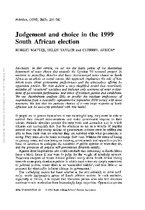| dc.contributor.author | Mattes, Robert | |
| dc.contributor.author | Taylor, Helen | |
| dc.contributor.author | Africa, Cherrel | |
| dc.date.accessioned | 2021-01-28T13:05:41Z | |
| dc.date.available | 2021-01-28T13:05:41Z | |
| dc.date.issued | 1999 | |
| dc.identifier.citation | Mattes, R. et al. (1999). Judgement and choice in the 1999 South African election. Politikon, 26(2), 235 -247 | en_US |
| dc.identifier.issn | 1470-1014 | |
| dc.identifier.uri | https://doi.org/10.1080/02589349908705084 | |
| dc.identifier.uri | http://hdl.handle.net/10566/5794 | |
| dc.description.abstract | In this article, we set out the basic points of the theoretical
framework of voter choice that underlie the Opinion '99 research project. In
contrast to prevailing theories that have characterized voter choice in South
Africa as an ethnic or racial census, this approach emphasizes the role of how
voters learn about government performance and the alternatives offered by
opposition parties. We then deduce a very simplified model that consciously
excludes all 'structural' variables and includes only measures of voter evaluations
of government performance and views of political parties and candidates.
We use discriminant analysis (DA) to predict the partisan preferences of
respondents from a nationally representative September 1998 survey with these
measures. We find that the partisan choices of a very large majority of South
Africans can be correctly predicted with this model. | en_US |
| dc.language.iso | en | en_US |
| dc.publisher | Taylor & Francis | en_US |
| dc.subject | South African | en_US |
| dc.subject | Election | en_US |
| dc.subject | Voter choice | en_US |
| dc.subject | Government performance | en_US |
| dc.subject | Voter performance | en_US |
| dc.title | Judgement and choice in the 1999 South African election | en_US |
| dc.type | Article | en_US |

